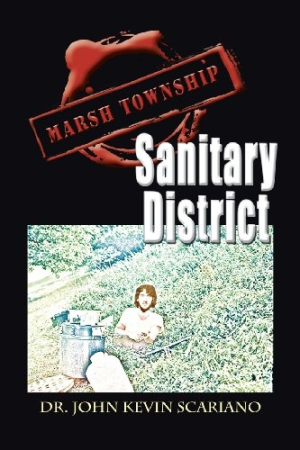Marsh Township Sanitary District
Scariano’s teenage recollections are graphic but tempered with genuine humor—not an easy feat when the subject is human waste.
John Kevin Scariano captures all the irreverence and sarcasm one would expect from a teenager working in a sewage treatment plant in the 1970s in Marsh Township Sanitary District. Thankfully, he does it with the charm and wit of an experienced author. In the tradition of graceful and hilarious American yarn-spinners Mark Twain and Jean Shepherd, Scariano writes in the vernacular of his time to teach the lesson his father wanted him to learn: the value of a dollar.
This book is a quick and thoroughly enjoyable read, especially for anyone who was subjected to a “character-building experience” as a teenager. Unfortunately, the cover is reminiscent of a high school PowerPoint presentation, and the book’s title sounds like a document from a city archive. But the story itself is quite literally a diamond in the murky, stinky rough.
Scariano and his family lived just outside of Chicago at a time when mob bosses and the politically corrupt held most of the cards. Scariano’s war veteran father, eager for his son to develop a good work ethic, secured a job for him at the Marsh Township Sanitary District. Over two summers, Scariano was subjected to backbreaking and foul-smelling hours of hazardous labor, supervised by men who saw him as a spoiled college boy. Among the hardworking immigrants, the arrogant wise guys, and the old boss who corners anyone he can with a story he’s told a hundred times, John learned his place. Scariano’s teenage recollections are graphic but tempered with the right amount of genuine humor—not an easy feat when the subject is human waste. But it’s his trips out of the plant and the occasional foray into Chicago history that keep this book surprising.
The author is masterful at retroactively weaving what he has come to know about the political and social reality of the time into the unexpected context of decades-old family conversations over dinner or the workers at the plant mocking each other. Scariano’s younger self is a perfect foil for the racism and sexism of the time. He challenges the plant workers about their slurs and stereotypes, standing up for his veteran father, questioning why racial epithets are used, and showing good manners around the one woman working at the plant. But he’s not a white knight. He smokes pot, takes advantage of an expense account, finds humor in fishing feces out of manholes, and has lunch at a strip club. He is educated, respectful, and delightfully crude in carrying out a father’s plan for his son.
Undoubtedly, Scariano still has regrets about how he spent those two summers, and perhaps this book was a form of therapy. In the end, it isn’t the value of a dollar that the reader will take away but the value of a book to recommend.
Reviewed by
Sara Budzik
Disclosure: This article is not an endorsement, but a review. The publisher of this book provided free copies of the book and paid a small fee to have their book reviewed by a professional reviewer. Foreword Reviews and Clarion Reviews make no guarantee that the publisher will receive a positive review. Foreword Magazine, Inc. is disclosing this in accordance with the Federal Trade Commission’s 16 CFR, Part 255.

